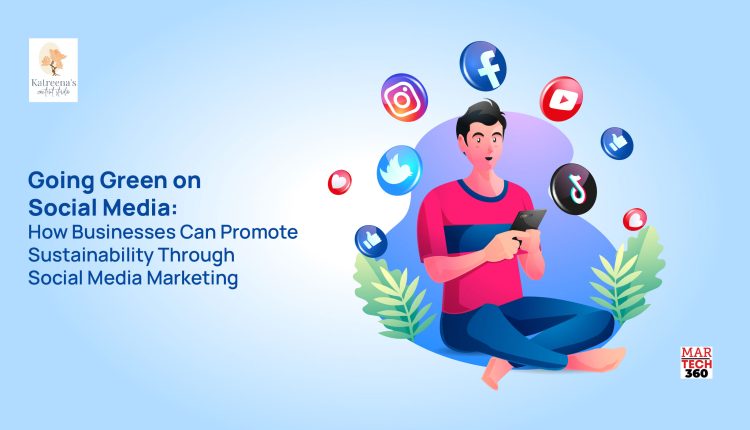Going Green on Social Media: How Businesses Can Promote Sustainability Through Social Media Marketing
Sustainable development is the key to preventing climate catastrophe. To achieve this, the United Nations has established 17 goals that aim to promote “prosperity while protecting the planet.”
Businesses play a crucial role in realizing these goals, and it is fortunate that many of them recognize this. Most businesses understand that going green not only helps protect the environment and society but also helps their bottom line.
Moreover, with the Securities and Exchange Commission’s (SEC) recent focus on ESG (Environmental, Social, and Governance) disclosure, businesses can benefit from transparently reporting their sustainability efforts to investors and stakeholders.
From using eco-friendly packaging materials to switching to renewable energy, businesses have many ways to contribute. Moreover, companies can also use their resources to educate people about sustainability. This is where social media marketing comes in.
This article discusses the many ways social media can be used to promote sustainability.
Let’s go!
1. Sharing sustainable practices
To promote sustainability through social media marketing, businesses can share their sustainable practices with customers. By doing so, they can showcase their commitment to sustainable practices and attract customers who value eco-friendliness.
Here are some examples of sustainable practices that businesses can share on social media:
- Using renewable energy sources
- Implementing recycling programs
- Reducing waste by using minimal packaging or using eco-friendly packaging materials
- Sourcing materials from sustainable suppliers
- Supporting local and organic agriculture
- Using energy-efficient equipment
Sharing sustainable practices on social media provides businesses with an opportunity to educate customers about the environmental impact of their products and services. This can encourage customers to adopt eco-friendly behaviors and contribute to a greener future.
In addition, sharing sustainable practices on social media can help businesses build a strong brand reputation and increase customer loyalty. Customers are more likely to support businesses that prioritize sustainability and align with their values. This can ultimately lead to increased sales and brand advocacy.
Also Read: How SMBs Can Drive Stronger SEO Through Stock Images and Videos
2. Using eco-friendly language
Businesses can promote sustainability by using eco-friendly language in their social media marketing. This approach can show their commitment to sustainability and attract environmentally responsible customers.
To use eco-friendly language, businesses can emphasize the environmental benefits of their products or services. For instance, instead of “cheap,” they can use “budget-friendly” or “economical.” Instead of “convenient,” they can use “time-saving” or “efficient.”
Other examples of eco-friendly language include
- Sustainable
- Eco-friendly
- Green
- Low carbon footprint
- Recyclable
- Compostable
- Biodegradable
- Non-toxic
Using eco-friendly language can appeal to customers who prioritize sustainability and demonstrate a business’s commitment to environmental responsibility.
3. Partnering with sustainability organizations
Businesses can amplify their sustainability efforts on social media by partnering with organizations that share their values. By collaborating with like-minded organizations, businesses can expand their reach. This allows them to make a bigger impact on promoting sustainable practices.
Partnering with sustainability organizations helps businesses to build their brand reputation. It also provides opportunities to connect with other businesses, learn from best practices, and identify areas for improvement.
Consider a clothing company that partners with a nonprofit promoting sustainable fashion. This partnership can help reduce the company’s carbon footprint, ensure fair labor practices, and attract customers who care about sustainable fashion.
Collaborating with sustainability organizations is a winning approach that benefits everyone. Sharing these partnerships on social media can inspire others to do the same and contribute to a more sustainable future.
4. Encouraging sustainable behavior
Promoting sustainable behavior through social media is a powerful way for businesses to inspire conscious choices that contribute to a greener world. By showcasing eco-friendly products and services and providing educational content, businesses can empower their customers to make more conscious choices.
Below are ways businesses can encourage sustainable behavior in social media:
- Highlight sustainable products and services: For instance, a beauty brand can promote its use of eco-friendly packaging or ingredients. This not only showcases the brand’s sustainability efforts but also encourages customers to make choices that align with their values.
- Sharing actionable tips and tricks: A fashion retailer can post about upcycling old clothing or reducing textile waste. By providing practical steps, businesses can help customers make a positive impact on the environment.
- Supporting environmental causes and initiatives: Companies can share information and updates on sustainability-related events, campaigns, and charities. This creates a sense of community and inspires customers to participate in making a difference.
The above practices can be effective in encouraging your audience to go green. However, it can be argued that the best way is leading by example. If your audience sees your company’s sincerity and commitment to sustainable development, everything you share on social media will carry more weight.
Final words
Promoting sustainability through social media marketing is crucial for businesses in today’s world. By following the strategies above, businesses can engage with their customers and contribute to a better future for the planet.


Comments are closed.